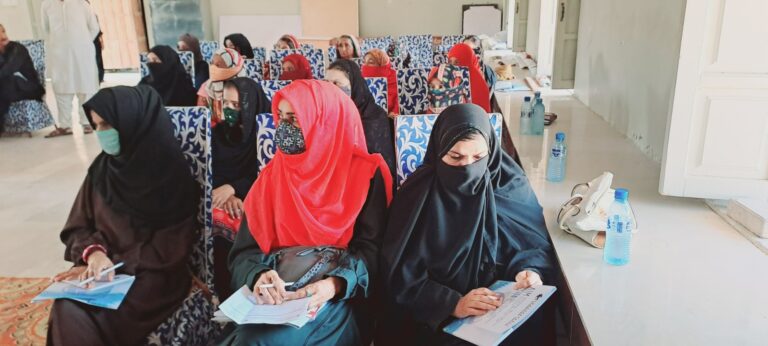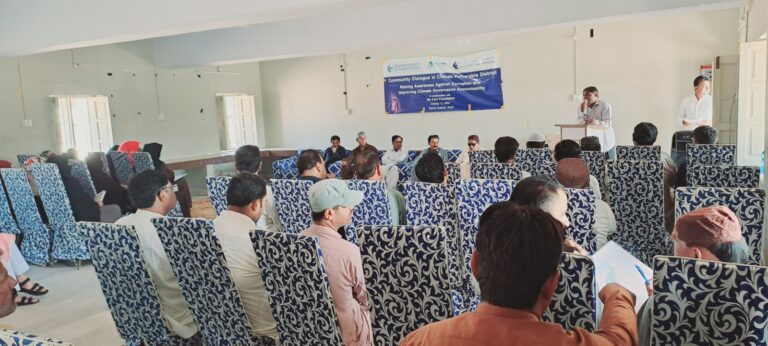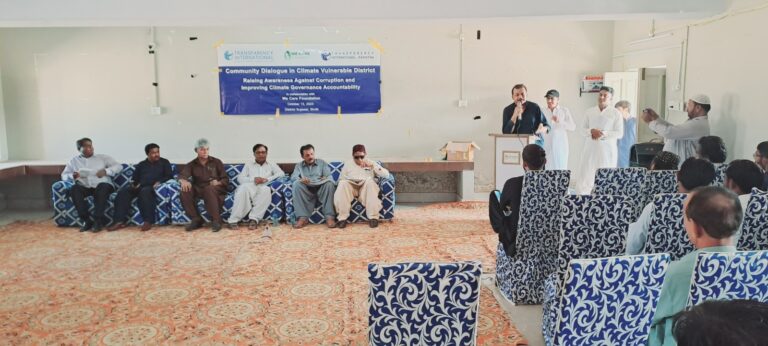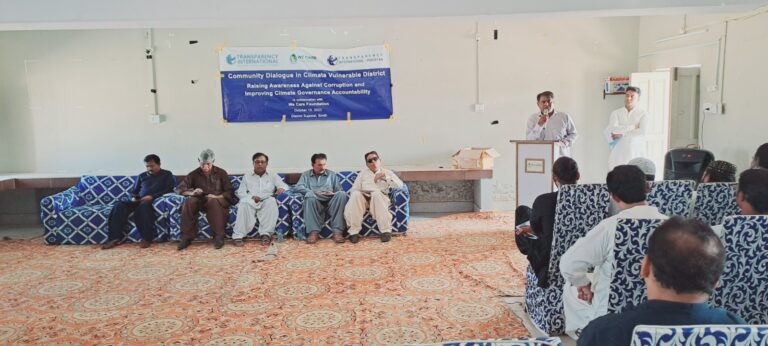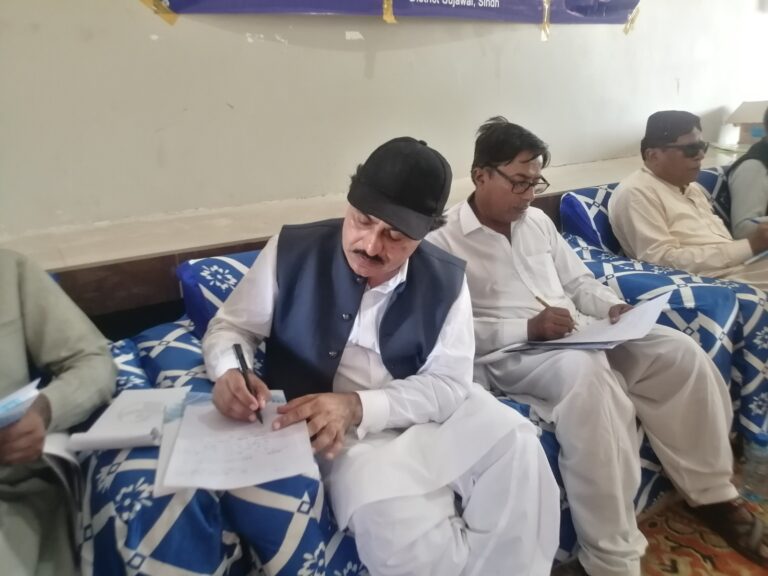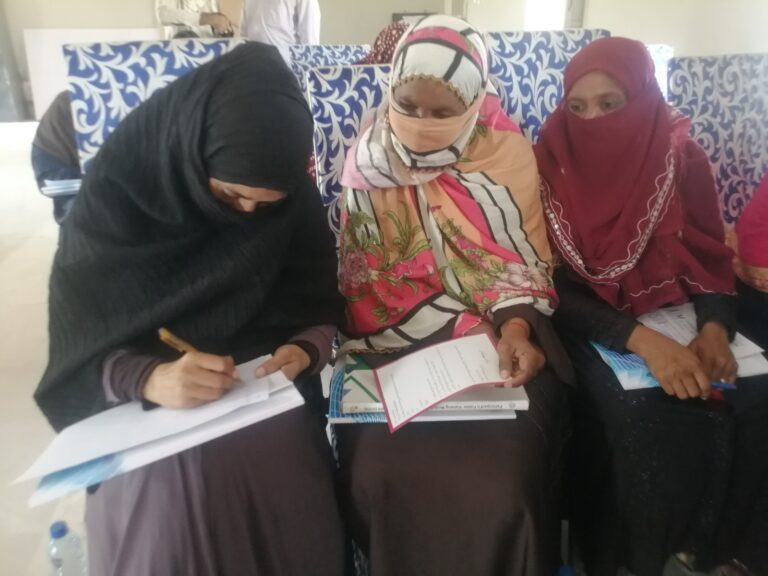- Home
- Community Dialogue in Climate Vulnerable District: Raising Awareness Against Corruption and Improving Climate Governance Accountability
Community Dialogue in Climate Vulnerable District: Raising Awareness Against Corruption and Improving Climate Governance Accountability
Community Dialogue in Climate Vulnerable District: Raising Awareness Against Corruption and Improving Climate Governance Accountability
Venue: District Sujawal, Sindh
Date: Monday, 13 October 2023
Transparency Intentional Pakistan organized a Community Dialogue in climate vulnerable district to raise awareness against environmental corruption among the marginalized communities to enhance citizen’s participation in climate decision-making and planning. The open dialogue took place on 13th October 2023 at District Sujawal, Sindh. Around 54 participants belonging to different communities and affected tehsils from District Sujawal attended the dialogue. The community dialogue was also attended by the representatives of the district administration.
The dialogue formally started with the recitation of the Holy Quran. After which a round of introduction was carried out by Mr. Muhammad Usman, CEO of We Care Foundation Sujawal. He welcomed the participants and emphasized the importance of community participation in advocating for improved climate governance at provincial and local level.
Moving on, Mr. Toufique Wassan, Project Coordinator, Tl Pakistan gave an overview of TI Pakistan “Strengthening Integrity and Inclusiveness in Climate Governance in Pakistan” program and highlighted that the objective of the community dialogue is to engage communities in calamity hit districts to empower them with the social accountability tools to monitor and report environmental corruption, enhance their awareness about provincial climate policies and the ways through which women, youth, local and marginalized communities can ensure their participation in climate planning.
He discussed in detail how Sindh’s climate policy ensures community participation in climate decision making and identified gaps which need improvement. He said that Sindh Climate Change Policy 2022 aims to work on gender sensitive interventions to incorporate the role of women in community organizations, increase women’s ability to access valuable resources, empowering them for decision-making and providing adequate information about climate change and coping strategies. He highlighted that the policy aims to strengthen community-based disaster preparedness and mitigation programs to build a climate resilient society and envisions to make disaster risk reduction a priority in local communities. He emphasized that community participation ensures that the solutions proposed for climate effects are tailored to the specific needs and vulnerabilities of the community. However, there is a gap when it comes to policy implementation.
Mr. Wassan further highlighted that there is a need to establish vigilance committees that can ensure an effective and efficient implementation of climate related projects with the consultation of youth, women, persons with disabilities and transgender communities in district Sujawal. The vigilance committees must be autonomous and responsible to ensure the budget transparency and accountability mechanisms from planning phase to the completion of every project. He encouraged members of the community to monitor climate related projects and their implementation and raise voice against irregularities.
Afterwards Ms. Fariha Fatima, Assistant Project Coordinator, Transparency International Pakistan, conducted a session on impacts of climate change and gendered vulnerability. She said that according to UN, women are 14 times more likely to die during a natural disaster than men. In disasters women face issues like displacement from their native place to relief camps where they do not have minimum facilities to survive with their children and family.
She explained how climate change hit women differently than men. Women suffer with harassment and domestic violence during and after disasters. They do not have access to clean water, safe toilets and medical facilities, and education during the disasters. Research conducted by Oxfam shows that during an emergency, woman have only 40 to 45% chance to have access to clean water, while men have more than 55% chance.
Afterwards, participants were invited for an interactive and experience sharing discussion on situation during 2022 floods which caused heavy damages as well as lose of livelihood, agricultural crops and to share experiences of humanitarian assistance received from provincial and federal government.
Mr. Ghulam Ali Shah, a community member, shared that his house was damaged in floods and he had to stay in a relief camp for months with his family where they lack access to clean water and medical facilities. Another member, Anil Kumar said that there are no proper medical facilities in their community area post flood. They must travel to the city for every medical emergency.
A female community member, Ms. Kulsoom pointed out the absence of female doctors which aggravates the spread of diseases within local communities. Dr. Muhammad Hanif Memon, District Health Officer (DHO) Sujawal, Sindh pointed out the damage caused to the health infrastructure during floods 2022 in district Sujawal. It was discussed that one of the reasons why health and education facilities are hit most by any calamity is the use of sub-standard material in construction.
Deputy Director Education Sujawal talked about the efforts of rebuilding schools in the area. He said that educational institutes served as safe places during the flood and a number of people were accommodated in schools while their homes were submerged and broken. He said that the department is working on rehabilitation of education infrastructure in the district.
Moving on, Mr. Wassan provided an overview of Advocacy and Legal Advice Centre of TI Pakistan. He said TI Pakistan always encourages the communities to identify and report the corrupt practices at grass root level, to the Advocacy and Legal Advice Centre. TI Pakistan regularly writes to the relevant officials to take notice and address the complaints of citizens. He further said that there is a dire need to educate the local communities on climate change mitigation, adaptation, resilience, and social accountability tools to enhance their effective participation in climate decision making and empower communities with the skills so they can identify and report environmental corruption. One of the social accountability tools effective for engagement in climate planning and decision making is Sindh Transparency and Right to Information Act 2016. He briefed the community members about the process of filling RTI requests to seek information relating to climate projects and decisions. He told the participants that every citizen has right to information, and it allows the citizens access to public information. He briefly explained about RTI application process, functions and responsibility of Sindh Information Commission.
In the end, participants wrote RTI applications to different departments. TI Pakistan will review RTI applications and submit to the relevant departments on behalf of the citizens.
Mr. Muhammad Usman, CEO of We Care Foundation Sujawal concluded the dialogue by thanking TI Pakistan, District administration and the participants from different communities for their participation in the community dialogue on climate change.


